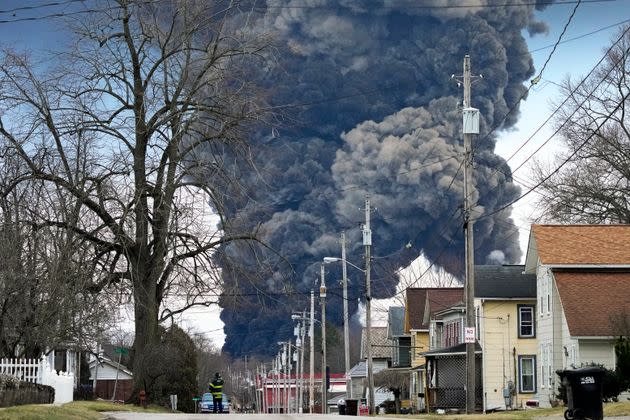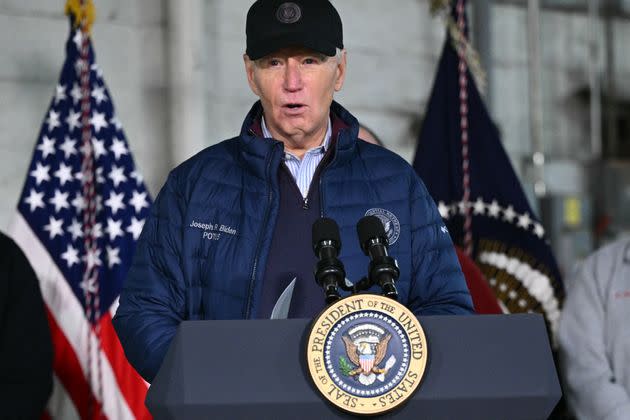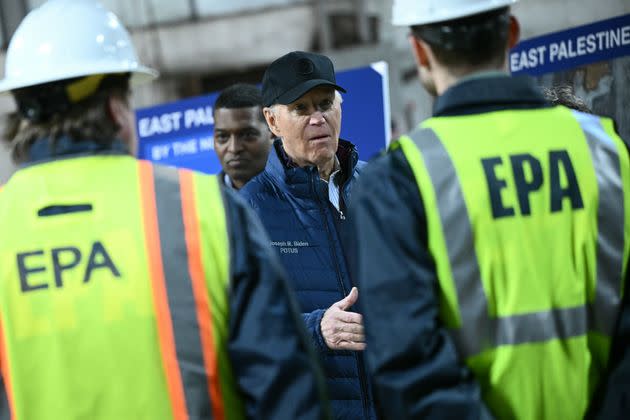Biden Says He’s Serious About Fighting Toxic Chemical Exposures. What About East Palestine?
President Joe Biden understands the devastating risks of toxic chemicals. “It’s personal,” he said in August 2022, before signing into law a bill to expand health care benefits for veterans exposed to toxic burn pits during deployments overseas.
“Toxic smoke, thick with poison, spreading through the air and into the lungs of our troops,” Biden said. “When they came home, many of the fittest and best warriors that we sent to war were not the same — headaches, numbness, dizziness, cancer. My son Beau was one of them.”
Biden’s oldest son died of brain cancer in 2015. The president has speculated that his son’s cancer was caused by exposure to toxic chemicals from burn pits during his military service in Iraq.
In the same vein, the White House has prioritized reducing chemical pollution in communities across the country, touting an “ambitious” agenda to protect public health and advance environmental justice.
Earlier this month, the Environmental Protection Agency moved to crack down on the ongoing practice of open burning of hazardous waste explosives, primarily military munitions, to reduce chemical exposures and better protect human health and the environment. In December, the EPA began the process of formally evaluating the risks of five specific chemicals, including vinyl chloride, a cancer-causing chemical used to make plastic. And in April, the EPA released a draft national strategy to combat plastic pollution, including reducing exposure to harmful chemicals released during production.
Much of the administration’s work on toxic substances falls under the umbrella of Biden’s Cancer Moonshot initiative, which aims to reduce the cancer death rate by 50% over the next 25 years.
But one incident casts a long shadow over the administration’s fight against toxic chemical exposures: last year’s derailment of a Norfolk Southern train in East Palestine, Ohio. The administration has been widely criticized by experts — including some from the EPA — for not stepping in to prevent the railroad giant from intentionally torching more than 1 million pounds of vinyl chloride, and for waiting weeks to test for dioxins, a family of extremely toxic compounds that are known to form when chlorinated chemicals like vinyl chloride combust.

The so-called controlled burn, which Norfolk Southern told federal and state responders was the only available option to prevent a potentially catastrophic explosion of chemical tanker cars, released thick black plumes of noxious smoke and exposed residents to potentially dozens of different chemicals. The EPA has distanced itself from the burn decision, telling HuffPost that while the agency was present during ad hoc meetings leading up to the burn, it did not sign off on and was not consulted about the decision. The administration has vowed to use “every available tool to hold Norfolk Southern accountable” for the incident.
When Biden traveled to East Palestine last month to mark the one-year anniversary of the derailment, he described the chemical disaster as “an act of greed” on the part of Norfolk Southern that “was 100% preventable.” And he touted the federal response and recovery efforts as “Herculean.”
Many impacted residents and independent experts would agree that the disaster was preventable. The chair of the National Transportation Safety Board recently testified before Congress that the decision to vent and burn tanker cars could have been avoided, as there was no sign of an imminent explosion of vinyl chloride cars.
But “Herculean” is not how many close observers, including former EPA officials and independent scientists, would describe the federal response in Ohio.
Stephen Lester, a toxicologist and the science director for the Center for Health, Environment and Justice, previously told HuffPost that the EPA’s handling of the situation is “as bad as I’ve ever seen them be” over his more than 40 years of working on contaminated sites. Judith Enck, a former EPA regional administrator, recently assailed the agency for not preventing Norfolk Southern from venting and burning vinyl chloride, saying that the EPA “sat idly by when a major bad decision was made.”

Much of the frustration and distrust stems from the early days of the response. Along with not intervening to prevent the chemical burn, the EPA dragged its feet on sampling for dioxins and did not consult certain relevant EPA experts, including a top dioxin expert, until a month after the derailment, as HuffPost previously reported. Meanwhile, it has repeatedly assured the community that extensive monitoring shows the air, water and soil are safe, despite the little that scientists understand about the risks of exposure to multiple chemicals at once and despite residents continuing to report a variety of ongoing health symptoms.
The open burning and open detonation of toxic chemicals have been banned in the United States since 1980 due to well-established risks to human health and the environment. The only exception is for waste explosives that cannot otherwise be safely disposed of.
Last week, the EPA announced a proposed rule to curb the ongoing practice of burning waste explosives by establishing stricter enforcement requirements and pushing facilities to use safer alternatives. EPA Administrator Michael Regan said in a statement accompanying the announcement that open burning “can have serious environmental and public health impacts, oftentimes in communities already overburdened by pollution,” and that the proposed rule “will work to better protect local communities from environmental and health harm.”
To be clear, the Ohio train derailment did not involve waste explosives. Still, Jami Wallace, a lifelong resident of East Palestine and president of the Unity Council for the East Palestine Train Derailment, called the EPA’s announcement “ironic,” given what played out in her community.
“They don’t follow the regulations that they already have in place regarding illegal open burns,” she said. “If you don’t enforce the regulation it’s pointless to have the regulation, and to me it’s even more pointless to update it.”
In an email, the White House did not directly respond to HuffPost’s questions about whether the EPA’s proposal on open burning helps advance Biden’s Cancer Moonshot initiative or if, given the evidence indicating that the burn operation in East Palestine was unnecessary, the EPA should have done more to prevent it from happening. The EPA said its role during the burn event was to conduct air monitoring from outside the evacuation area.
“From Day One, the Biden-Harris Administration has taken historic action to protect the health and safety of all communities, including through the Biden Cancer Moonshot, which is mobilizing a national effort to end cancer as we know it,” a White House spokesperson said in the email. “Whether it’s safeguarding the air our children breathe, delivering clean, safe drinking water, or protecting communities from toxic chemicals and carcinogens, this Administration will continue to take ambitious action to ensure the health and safety of all Americans.”

In an exclusive interview with HuffPost earlier this month, Kevin Garrahan, a retired EPA official of nearly 40 years, flagged a 2022 EPA memo on the dangerous practice of open burning of hazardous materials — a document he said makes clear that the vent and burn operation in East Palestine violated long-standing EPA regulations. More than a year after the derailment, the EPA still hasn’t taken a position on whether it was a prohibited “open burn.” The agency has stressed that it was not involved in the decision — saying that it was made by the local fire chief in consultation with Norfolk Southern, local law enforcement and Ohio officials — while continuing to adopt Norfolk Southern’s “controlled burn” language.
Garrahan applauded Biden and the EPA for its latest effort to protect the public and the environment from the risks of ongoing open burning of hazardous waste explosives. He called the EPA’s newly proposed rule “a big deal,” but said it does little to allay his concerns about the chemical burn in East Palestine.
“On the contrary, the proposed regulations provide compelling evidence that EPA has a lot of subject matter expertise on the practice of open burning,” he said via email. “EPA’s impressive expertise on open burning, however, makes it appear even less likely that the open burn in East Palestine, the lack of comprehensive environmental monitoring, and the mislabelling of the burn as a ‘controlled release’ was caused by a lack of knowledge.”
“You look at East Palestine and think, ‘How did this fall through the cracks?’” he said.
An EPA spokesperson said that the agency remains “very focused on protecting the health of the East Palestine community.” In an executive order last year, Biden tasked the Department of Health and Human Services to coordinate with Ohio and neighboring Pennsylvania to monitor for any long-term health impacts from the derailment.
The administration has repeatedly taken action on its broader pledge to protect Americans from dangerous substances. In recent weeks, Biden’s EPA announced both a comprehensive ban on asbestos and new rules to limit emissions of ethylene oxide — two of several actions that the White House said help advance the president’s fight to end cancer. In a statement about the asbestos ban, the White House said the administration is “delivering on the promise to protect communities from the harmful effects of toxic substances, including carcinogens.”
“Reducing exposure to toxic chemicals protects public health and advances President Biden’s commitment to ensuring all people can breathe clean air, drink clean water, and live in a healthy community,” the White House added, going on to list several recent actions to protect people from cancer-causing chemicals.
That list, however, did not include the EPA’s new proposal to strengthen open burning rules or the separate step it took late last year to begin evaluating the risks of vinyl chloride, the carcinogenic chemical at the heart of the East Palestine disaster.
One thing that Enck, the former EPA regional administrator and current president of the environmental group Beyond Plastics, wants to see in the wake of the Ohio disaster is a ban on vinyl chloride. She noted that the chemical was designated a carcinogen five decades ago.
“Equally important, they need to adopt a policy advising that no federal agency should allow for vinyl chloride to be burned in any circumstance, including train derailments,” she said of the Biden administration. “The open burning of vinyl chloride in East Palestine was a serious mistake and should never be repeated. It is not clear if the federal agencies understand the seriousness of this mistake or if they will put in place policies and procedures to ensure that open burning of this nature never happens again.”

